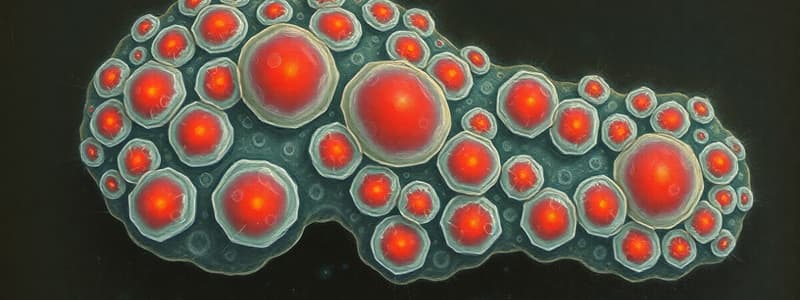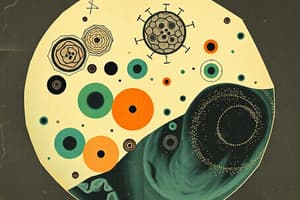Podcast
Questions and Answers
What is the primary function of the cell wall in plant cells?
What is the primary function of the cell wall in plant cells?
- Storing energy for the cell
- Regulating the movement of ions into the cell
- Providing shape and support to the cell (correct)
- Facilitating photosynthesis in chloroplasts
Which organelle is responsible for respiration and energy release in cells?
Which organelle is responsible for respiration and energy release in cells?
- Chloroplast
- Ribosome
- Vacuole
- Mitochondrion (correct)
Which statement correctly describes vacuoles in mature plant cells?
Which statement correctly describes vacuoles in mature plant cells?
- They are small and temporary structures
- They are large and filled with cell sap (correct)
- They are absent in mature cells
- They contain solid nutrients only
What is a significant difference between animal and plant cells regarding their cell walls?
What is a significant difference between animal and plant cells regarding their cell walls?
Which organelle is primarily associated with the process of photosynthesis?
Which organelle is primarily associated with the process of photosynthesis?
What is found in the cytoplasm of a cell?
What is found in the cytoplasm of a cell?
What is the significance of having more mitochondria in active cells?
What is the significance of having more mitochondria in active cells?
How do vacuoles in animal cells compare to those in plant cells?
How do vacuoles in animal cells compare to those in plant cells?
Which statement about the cytoplasm is true?
Which statement about the cytoplasm is true?
Flashcards are hidden until you start studying
Study Notes
Cell Membrane
- Forms a boundary between the cell's interior and its environment.
- Regulates movement of substances in and out of the cell.
Cytoplasm
- Site of all cellular activities.
- Contains organelles like mitochondria and ribosomes, as well as food reserves (glycogen, starch, oil droplets).
- Appears granular in structure.
Mitochondrion
- Organelle where respiration occurs, providing energy for cellular functions.
- Active cells, such as liver cells, have numerous mitochondria.
- Structure is typically not clearly visible under light microscopy.
Cell Wall
- Nonliving layer external to the cell membrane in plant cells.
- Permits free passage of liquids and dissolved substances.
- Provides shape and structural support to plant cells.
- Absent in animal cells.
Vacuole
- Mature plant cells contain a large central vacuole filled with cell sap (dilute solution of salts and sugars).
- May also contain pigments.
- Animal cells may have small, temporary vacuoles.
Chloroplast
- Organelle that contains the green pigment chlorophyll found in plant cells.
- Abundant in palisade cells of leaves, where photosynthesis takes place.
- Not present in animal cells.
Studying That Suits You
Use AI to generate personalized quizzes and flashcards to suit your learning preferences.




